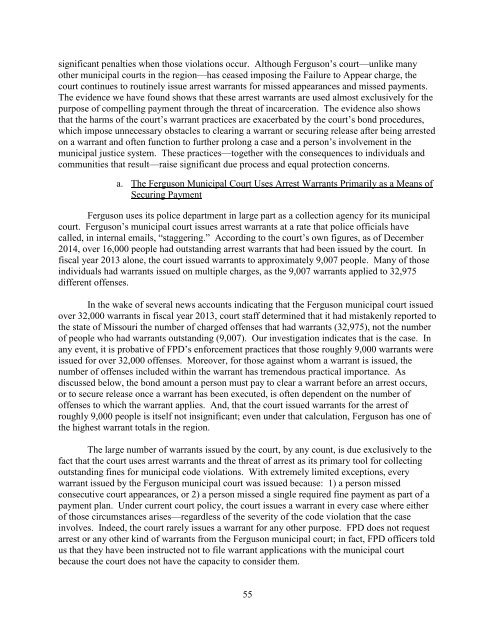U.S. Justice Department Report on the Ferguson Police Department
Ferguson’s law enforcement practices are shaped by the City’s focus on revenue rather than by public safety needs. This emphasis on revenue has compromised the institutional character of Ferguson’s police department, contributing to a pattern of unconstitutional policing, and has also shaped its municipal court, leading to procedures that raise due process concerns and inflict unnecessary harm on members of the Ferguson community.
Ferguson’s law enforcement practices are shaped by the City’s focus on revenue rather than by public safety needs. This emphasis on revenue has compromised the institutional character of Ferguson’s police department, contributing to a pattern of unconstitutional policing, and has also shaped its municipal court, leading to procedures that raise due process concerns and inflict unnecessary harm on members of the Ferguson community.
You also want an ePaper? Increase the reach of your titles
YUMPU automatically turns print PDFs into web optimized ePapers that Google loves.
significant penalties when those violati<strong>on</strong>s occur. Although Fergus<strong>on</strong>’s court—unlike many<br />
o<strong>the</strong>r municipal courts in <strong>the</strong> regi<strong>on</strong>—has ceased imposing <strong>the</strong> Failure to Appear charge, <strong>the</strong><br />
court c<strong>on</strong>tinues to routinely issue arrest warrants for missed appearances and missed payments.<br />
The evidence we have found shows that <strong>the</strong>se arrest warrants are used almost exclusively for <strong>the</strong><br />
purpose of compelling payment through <strong>the</strong> threat of incarcerati<strong>on</strong>. The evidence also shows<br />
that <strong>the</strong> harms of <strong>the</strong> court’s warrant practices are exacerbated by <strong>the</strong> court’s b<strong>on</strong>d procedures,<br />
which impose unnecessary obstacles to clearing a warrant or securing release after being arrested<br />
<strong>on</strong> a warrant and often functi<strong>on</strong> to fur<strong>the</strong>r prol<strong>on</strong>g a case and a pers<strong>on</strong>’s involvement in <strong>the</strong><br />
municipal justice system. These practices—toge<strong>the</strong>r with <strong>the</strong> c<strong>on</strong>sequences to individuals and<br />
communities that result—raise significant due process and equal protecti<strong>on</strong> c<strong>on</strong>cerns.<br />
a. The Fergus<strong>on</strong> Municipal Court Uses Arrest Warrants Primarily as a Means of<br />
Securing Payment<br />
Fergus<strong>on</strong> uses its police department in large part as a collecti<strong>on</strong> agency for its municipal<br />
court. Fergus<strong>on</strong>’s municipal court issues arrest warrants at a rate that police officials have<br />
called, in internal emails, “staggering.” According to <strong>the</strong> court’s own figures, as of December<br />
2014, over 16,000 people had outstanding arrest warrants that had been issued by <strong>the</strong> court. In<br />
fiscal year 2013 al<strong>on</strong>e, <strong>the</strong> court issued warrants to approximately 9,007 people. Many of those<br />
individuals had warrants issued <strong>on</strong> multiple charges, as <strong>the</strong> 9,007 warrants applied to 32,975<br />
different offenses.<br />
In <strong>the</strong> wake of several news accounts indicating that <strong>the</strong> Fergus<strong>on</strong> municipal court issued<br />
over 32,000 warrants in fiscal year 2013, court staff determined that it had mistakenly reported to<br />
<strong>the</strong> state of Missouri <strong>the</strong> number of charged offenses that had warrants (32,975), not <strong>the</strong> number<br />
of people who had warrants outstanding (9,007). Our investigati<strong>on</strong> indicates that is <strong>the</strong> case. In<br />
any event, it is probative of FPD’s enforcement practices that those roughly 9,000 warrants were<br />
issued for over 32,000 offenses. Moreover, for those against whom a warrant is issued, <strong>the</strong><br />
number of offenses included within <strong>the</strong> warrant has tremendous practical importance. As<br />
discussed below, <strong>the</strong> b<strong>on</strong>d amount a pers<strong>on</strong> must pay to clear a warrant before an arrest occurs,<br />
or to secure release <strong>on</strong>ce a warrant has been executed, is often dependent <strong>on</strong> <strong>the</strong> number of<br />
offenses to which <strong>the</strong> warrant applies. And, that <strong>the</strong> court issued warrants for <strong>the</strong> arrest of<br />
roughly 9,000 people is itself not insignificant; even under that calculati<strong>on</strong>, Fergus<strong>on</strong> has <strong>on</strong>e of<br />
<strong>the</strong> highest warrant totals in <strong>the</strong> regi<strong>on</strong>.<br />
The large number of warrants issued by <strong>the</strong> court, by any count, is due exclusively to <strong>the</strong><br />
fact that <strong>the</strong> court uses arrest warrants and <strong>the</strong> threat of arrest as its primary tool for collecting<br />
outstanding fines for municipal code violati<strong>on</strong>s. With extremely limited excepti<strong>on</strong>s, every<br />
warrant issued by <strong>the</strong> Fergus<strong>on</strong> municipal court was issued because: 1) a pers<strong>on</strong> missed<br />
c<strong>on</strong>secutive court appearances, or 2) a pers<strong>on</strong> missed a single required fine payment as part of a<br />
payment plan. Under current court policy, <strong>the</strong> court issues a warrant in every case where ei<strong>the</strong>r<br />
of those circumstances arises—regardless of <strong>the</strong> severity of <strong>the</strong> code violati<strong>on</strong> that <strong>the</strong> case<br />
involves. Indeed, <strong>the</strong> court rarely issues a warrant for any o<strong>the</strong>r purpose. FPD does not request<br />
arrest or any o<strong>the</strong>r kind of warrants from <strong>the</strong> Fergus<strong>on</strong> municipal court; in fact, FPD officers told<br />
us that <strong>the</strong>y have been instructed not to file warrant applicati<strong>on</strong>s with <strong>the</strong> municipal court<br />
because <strong>the</strong> court does not have <strong>the</strong> capacity to c<strong>on</strong>sider <strong>the</strong>m.<br />
55

















